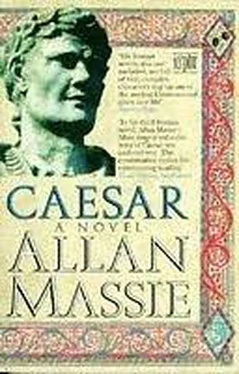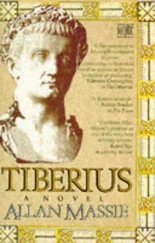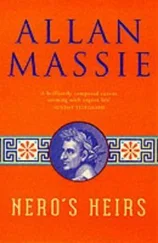Allan Massie - Caesar
Здесь есть возможность читать онлайн «Allan Massie - Caesar» весь текст электронной книги совершенно бесплатно (целиком полную версию без сокращений). В некоторых случаях можно слушать аудио, скачать через торрент в формате fb2 и присутствует краткое содержание. Жанр: Исторические приключения, на английском языке. Описание произведения, (предисловие) а так же отзывы посетителей доступны на портале библиотеки ЛибКат.
- Название:Caesar
- Автор:
- Жанр:
- Год:неизвестен
- ISBN:нет данных
- Рейтинг книги:3 / 5. Голосов: 1
-
Избранное:Добавить в избранное
- Отзывы:
-
Ваша оценка:
- 60
- 1
- 2
- 3
- 4
- 5
Caesar: краткое содержание, описание и аннотация
Предлагаем к чтению аннотацию, описание, краткое содержание или предисловие (зависит от того, что написал сам автор книги «Caesar»). Если вы не нашли необходимую информацию о книге — напишите в комментариях, мы постараемся отыскать её.
Caesar — читать онлайн бесплатно полную книгу (весь текст) целиком
Ниже представлен текст книги, разбитый по страницам. Система сохранения места последней прочитанной страницы, позволяет с удобством читать онлайн бесплатно книгу «Caesar», без необходимости каждый раз заново искать на чём Вы остановились. Поставьте закладку, и сможете в любой момент перейти на страницу, на которой закончили чтение.
Интервал:
Закладка:
Mark Antony led the cheering in which we all joined. There was relief that the period of uncertainty was over, that we had arrived at the moment when all was put to the test.
I confess that my own cheers were all the louder because of the fear I felt. It will be difficult for future generations to understand the awe which Pompey inspired. But it was natural. He had been the great man in Rome all my life. His achievements in Asia were unprecedented. Even Caesar's conquest of Gaul, in which I had been proud to participate, seemed a small thing in comparison. The Gauls were no better than brave barbarians, ignorant of the art of war. But Pompey had defeated great kingdoms and brought them under the yoke of Rome. Our Empire was his creation, rather than that of any other individual. For years he had overshadowed Caesar. I knew that when they first came together, Caesar was the least of the Triumvirate he formed with Pompey and Marcus Crassus. He lacked the former's reputation and the latter's wealth.
Our party had nothing to compare with Pompey's renown; it had nothing to compare with the wealth of his supporters. When I looked round that dinner-table, I saw few men whom the world had learned to respect, some — Casca, Antony, chief among them — whom it was accustomed to despise. I knew that many of Caesar's adherents were as insolvent as Casca, desperate to repair their fortunes in the wreck of the State.
I was not among them; nor was I, like others, an adventurer of no breeding. I came from one of the greatest Patrician families; I could boast a dozen consuls among my ancestors. I was rich. My estates alone could support me in luxury, when I came to inherit them — and my father was old. I had nothing to gain, for I lacked neither wealth, reputation nor standing, and much to lose. Yet I held to Caesar.
If any ask why, I cannot well answer. When I read historians, I am amazed by the certainty with which they assure us of the motive of actions. It is curious that they know such things, when few could tell us with equal certainty why they fall in love with a woman or a boy. I was attached to Caesar's staff as a young officer in Gaul. It might be natural to suggest that this determined my allegiance. But Labienus, who was much closer to him, deserted his cause, though Caesar had never spoken of Labienus anything but warmly. Some said it was because he came from Picenum, Pompey's stronghold, and so owed a prior allegiance. I do not believe this. Something in Caesar's manner offended him. Was it perhaps the very same thing which held me to the General?
I perplex myself with these questions, now, when it can scarcely matter, when it may be that nothing matters. I do not believe I have long to live. I am kept here by the Gauls as a pawn, a bargaining-counter. I foresee an ignominious end. This morning I asked the youth who has been assigned to me, and who speaks tolerable Latin, if there was any news. I deduced the worst from his silence. But it may be he is only ignorant. After all, why should he be acquainted with affairs of State?
Yes, I confess. I am apprehensive. I do not fear death. No Roman nobleman does. I should like only to be certain that I may die in a manner worthy of my ancestors. It is my fear that this will not be permitted me. A knife in the dark is more likely; then my head sent to my enemies as token of a good deed. That was Pompey's fate. Caesar pretended to be disgusted; inwardly he was relieved. He wouldn't have known what to do with Pompey, who had not been a suitable subject for his famous clemency.
I run ahead of myself, here where I am held still.
Caesar's charm, Caesar's famous charm. He had a habit of putting his arm round you, and taking the lobe of your ear between his thumb and forefinger, and playing with it while he confided, or seemed to confide, his secrets to you. I wouldn't have tolerated this from any other man. When Caesar held me thus, I felt a thrill of pleasure. Does that admission demean me?
My perplexity is all the greater, because unlike Antony and Curio, I had no certainty of victory.
When Caesar retired that night, Antony stretched himself on the couch and called for the slaves to bring another flagon of wine.
He smiled at me.
"You'll stay and drink? You'll share this gaudy night, won't you?"
"The General suggested we should retire early. There's a war to be fought," I said, taking the next couch and reaching for the wine.
"There will be no fighting, not for a long time," Antony said. "It's a picnic, a holiday excursion." "How can you be so sure?"
The smile that charmed and seduced men and women, that smile I so envied, spread across his face. There were always moments when Antony seemed like the god Apollo.
"They'll run like hares," he said. "You forget," he added, "I've just come from Rome. I know the calibre of our enemies. Nothing but wind. You heard I had to disguise myself as a slave? That meant that for a couple of days I congregated with slaves. Slaves talk among themselves in a way their masters never credit. Did you know that?"
He poured more wine, and waved the slaves who were in attendance away.
"Do you know what they said? They said that the Optimates — you know that's what Cicero calls the collection of elderly boobies arrayed against us? They said they were shit-scared. I could believe it."
"Pompey?" I said.
"Pompey is finished. He may have been a great man once. Now…" he turned his thumb down. "You've been in Gaul. Have you seen Pompey lately?"
"I was in Rome last winter. I saw him being carried in a litter through the Forum."
"In a litter… The Great One is now a great lump of lard. He never knew much, except — I grant this — how to draw up an army. But in politics he was always a baby. He's been outmanoeuvred by Caesar's enemies, who were his enemies not so long ago, most of his life in fact. They've imprisoned him, and all he has left is his reputation. Reputation. I don't give a fiddler's fart for reputation. No, dear boy, the campaign before us will be like nothing you have seen in Gaul. They fight there. This time it will be a battle of flowers. And words. You can count on Cicero for words. What do you suppose the women are like in this town?"
So I accompanied Antony to a brothel, and went drunk and sated to bed as the sun rose. That was how I began the great Italian campaign.
Читать дальшеИнтервал:
Закладка:
Похожие книги на «Caesar»
Представляем Вашему вниманию похожие книги на «Caesar» списком для выбора. Мы отобрали схожую по названию и смыслу литературу в надежде предоставить читателям больше вариантов отыскать новые, интересные, ещё непрочитанные произведения.
Обсуждение, отзывы о книге «Caesar» и просто собственные мнения читателей. Оставьте ваши комментарии, напишите, что Вы думаете о произведении, его смысле или главных героях. Укажите что конкретно понравилось, а что нет, и почему Вы так считаете.












